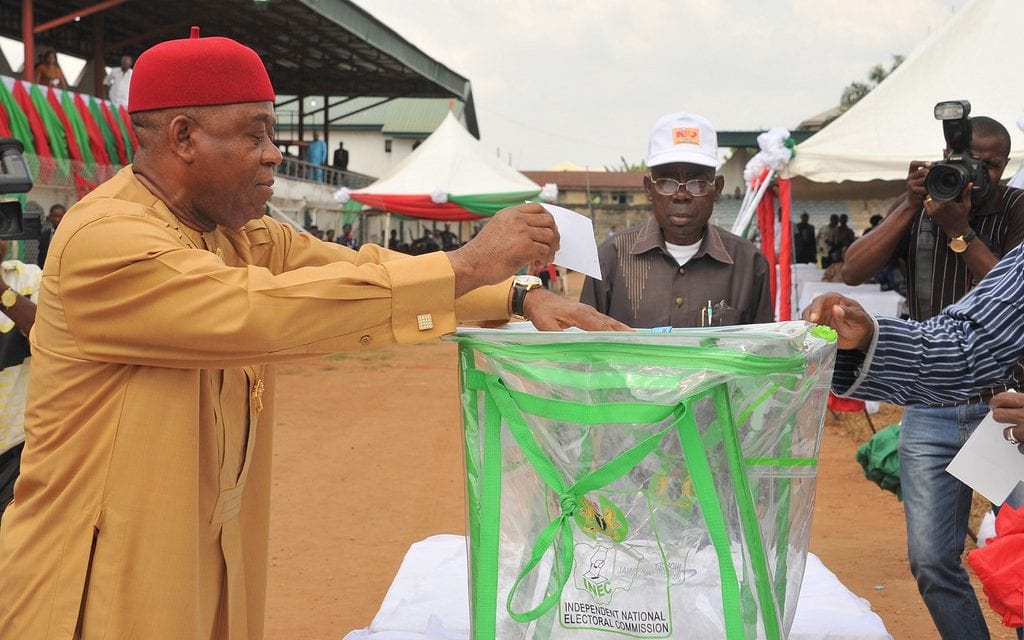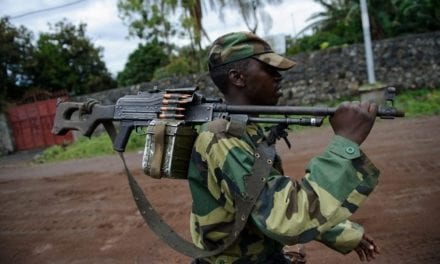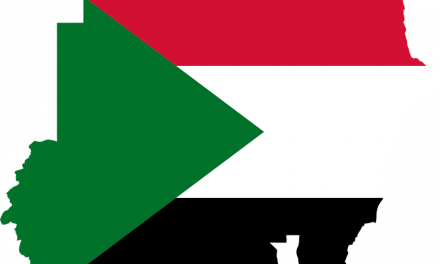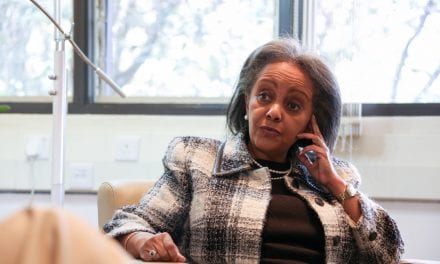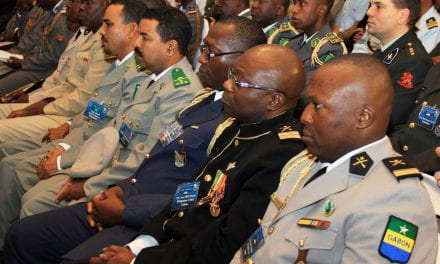By: Harold Niebel*
In the past several months, many African countries have conducted presidential elections. The elections in Senegal, the Democratic Republic of the Congo (DRC), and Nigeria vary in legitimacy and reputability reflecting the contemporary challenges to African democracy. In Senegal, there were widespread accusations of the president stifling democracy by arresting political opponents; in the Democratic Republic of the Congo, Joseph Kabila relinquished his 18-year hold on power, but was believed to have agreed to a power-sharing deal before the election results were announced; Lastly, Nigeria’s elections experienced widespread violence and logistical delays that led to one of the most tumultuous and deadly elections in Sub-Saharan Africa in recent history. To mitigate the issues associated with elections in Africa, robust accountability mechanisms to work against corruption and election fraud should be instituted.
Results from Senegal’s February 2019 elections show that the President Macky Sall won re-election with a 58 percent majority. Sall’s victory comes as no surprise to foreign countries or the Senegalese opposition. Despite the modest preliminary election results and praise from organizations like the African Union on the transparency of the elections, some argue that irregularities were still widespread. Over seven candidates were barred from running because of corruption charges brought forward by the Senegalese government, including the main opposition candidates, Khalifa Sall and Karime Wade.[1] Imprisoning his main opponents has raised suspicion among opposition members, who have accused Sall of fostering conditions conducive to his victory. Additionally, heavy-handed crackdowns on protests prior to the elections have demonstrated a reluctance to allow groups to freely express themselves or their political aims. Despite the limitations of Senegal’s democratic process, election observers have not suggested any widespread electoral malpractice. Though Senegal still faces election-related challenges, its electoral practices are better organized, regulated, and legitimate than those of other countries throughout the continent.
The Democratic Republic of the Congo achieved its independence on 30 June 1960. In its 59 years of independence, the DRC fell victim to strong authoritarian regimes, civil war, and consistently violent transfers of power. The DRC experienced its first ‘peaceful’ transfer of power in January 2019, when President Joseph Kabila ceded power to Felix Tshisekedi. Despite the transfer of power, there were no shortages of irregularities and malpractice that preceded and accompanied the elections. For example, the DRC 2018 elections were scheduled to take place in November 2016 and were systematically delayed. In 2014, the lower house of the Congolese parliament passed a law requiring a census before elections, to ensure accurate voter registries.[2] This law was passed to prolong president Kabila’s tenure in office by another two years. Further, in October 2018, a fire destroyed over eight thousand voting machines, according to the National Independent Electoral Commission (CENI), delaying the elections by another two months. After the announcement of Tshisekedi’s victory, Kabila and Tshisekedi were accused of colluding and fixing the elections in favor of Tshisekedi. The opposition candidate, Martin Fayulu, is thought to have been the ‘people’s choice,’ however, the DRC’s Constitutional Court has denied appeals for an election recount from Fayulu, the Congolese Catholic Church, and the African Union.[3]
Since his victory, Tshisekedi has announced a power-sharing government between his party, the Common Front for Congo (CFC) and Kabila’s, the People’s Party for Reconstruction and Development (PPRD). The CFC holds a minority in the Congolese parliament, which makes the PPRD the parliamentary kingmaker, which in turn makes Kabila, the head of the PPRD, a significantly influential member of the Congo’s government.[4] Power transfers in the DRC have been historically characterized by violence, including the overthrow of Mobutu Sese-Seko in 1995 and the assassination of Laurent Kabila in 2001; however, the smooth and peaceful transfer of power comes as a refreshing change for the DRC.[5] Despite the peaceful transition of power, the DRC’s democratic integrity remains precarious. The DRC, like many other African countries must initiate significant advancements in accountability and infrastructure development initiatives to improve the integrity, reliability, and legitimacy of democracy.
Finally, the Nigerian Presidential elections took place on February 23, 2019. The Nigerian elections have been plagued by allegations of vote rigging, violence, and unrest. Nigeria has a history of turbulent political takeovers. In the span of thirty years, Nigeria experienced eight coups and only returned to a semi-legitimate democracy in the late 1990s, when General Obasanjo won the 1999 presidential elections and remained in power until 2007.[6] After its previous elections in 2015, Nigeria experienced a rare feat for African democracy: President Goodluck Johnathan peacefully ceded power to opposition member Muhammadu Buhari. Despite the successes of the previous elections, the characteristic is unlikely to hold, as the 2019 elections have been marred with accusations of vote rigging, violence and unrest.
According to the Nigerian electoral commission (INEC), the incumbent, Muhammadu Buhari took an early lead on February 25th.[7] The opposition, Akitu Abubakar, and the European Union, United States, and African Union have expressed concern over the legitimacy of the elections. Widespread concerns of irregularities including voter intimidation and the destruction of ballot boxes in cities in the south have been voiced by the opposition and independent monitoring groups, like the Southern African Development Community (SADC). Additionally, forty-seven people are reported to have died because of election-related violence.[8]Nigeria’s most recent elections are a step in the opposite direction from where Nigeria should be headed. Nigeria’s political history suggests that the country (and more broadly, the region) is susceptible to cyclical periods of political upheaval and violence. Conducting elections with widespread irregularities furthers the regional democratic challenges of West Africa, and creates an environment complacent with illegitimate and unconventional transfers of power.
Senegal, the DRC, and Nigeria have different degrees of reliability in their most recent elections. However, Significant hurdles still must be overcome to better address the challenges African countries face today. The two commonalities of Senegal, Nigeria, and the DRC are corruption and the absence of proper infrastructure to effectively implement meaningful elections. Corruption creates a disincentive for political figures to leave office, as staying in office becomes a lucrative and profitable venture. Additionally, the money siphoned from the government reduces the capacity of electoral organizations like CENI, CENA, and INEC to effectively carry out their duties. The lack of infrastructure significantly inhibits the citizens right to vote by delaying the delivery of essential voter materials, like voter cards and ballot boxes. To ameliorate these issues, mechanisms of accountability and investment must be institutionalized which will aid in the implementation of stronger and more resilient democracies across the continent.
The African Union estimates that 148 billion USD is lost due to corruption every year, when divided by the number of countries in Africa (54) the average African country loses almost 3 billion USD per year through corruption. In the DRC, the money lost to corruption could have been used to supply the shortage of 1.8 billion USD which was needed to conduct an election in 2017.[9] Additionally, larger infrastructural projects, such as the construction of roads, polling stations, and the dissemination of voter information to streamline elections must be pursued to give citizens the resources and ability to vote. The African Development Bank (AfDB) spends almost 170 Billion USD per year on development initiatives in Africa. Despite the significant development funding, most of the funds are used to expand on existing infrastructure in the capitals or areas surrounding the administrative and political hubs. The more pressing issue is to invest in infrastructure that expands outside of the capital and into the regions that are disconnected from metropolitan areas.
Democracy in Africa has taken great leaps in recent years, however challenges to creating an effective, legitimate, and well-functioning democracy are still widespread. By addressing the key challenges that inhibit the progression of democracy, such as corruption and infrastructural development, African countries will be in a better position to adopt and implement better democratic frameworks and institutions.
[1]”The Five Candidates Running in Senegal’s Presidential Election,” Reuters. February 20, 2019, Accessed February 26, 2019.
[2]Ross, Aaron, “Congo Parliament Passes Election Law Stripped of Census Requirement,” Reuters. January 25, 2015, Accessed February 26, 2019.
[3]Agencies, “DRC Court Confirms Felix Tshisekedi Winner of Presidential Election,” The Guardian, January 20, 2019, Accessed February 26, 2019.
[4]Paravicini, Giulia. “Congo’s Ex-leader Kabila’s Party to Pick Prime Minister-sources,” Reuters, March 08, 2019, Accessed March 26, 2019, https://af.reuters.com/article/drcNews/idAFL5N20V3WO.
[5]”Democratic Republic of the Congo: Elections 2018,” GCC News Al Jazeera, Accessed February 26, 2019.
[6]”Africa Nigeria Elections Timeline,” BBC News, March 08, 1999, Accessed February 26, 2019.
[7]”Nigeria Election 2019: Muhammadu Buhari Takes Early Lead,” BBC News, February 25, 2019, Accessed February 26, 2019.
[8]Akwagyiram, Alexis, “Nigeria’s President Buhari Takes Unassailable Lead in Election:…” Reuters. February 26, 2019, Accessed February 26, 2019.
[9]Burke, Jason, “DRC Minister Says Country ‘can’t Afford’ to Hold Election This Year,” The Guardian. February 16, 2017, Accessed February 26, 2019.
*Disclaimer: The content contained in the following material is the sole ownership of the author and does not reflect the Towson University Journal of International Affairs nor Towson University in any respect whatsoever.

